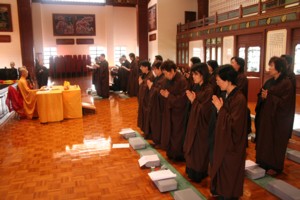Submitted by Ah Jin on

The aspiration to liberate sentient beings from suffering and from endless round of rebirth due to ignorance has led the compassionate Buddha to spend 45 years preaching the Dharma.
In the same vein and in an effort to bolster the dharma cultivation of the staff and volunteers, Ven. Wei Wu recruited a new batch for the induction of the ten moral precepts and conferment of the second batch of lay sangha for the New Year.
The ten moral precepts is the fundamental on morality forming the basic precepts of the Sravaka (Hearers) and Bodhisattva. By practicing the ten moral precepts, one will not be reborn in the three woeful states of hell-beings, hungry ghost and animal. If, in addition, one were to further cultivate one’s wisdom, one would be liberated via the path of a Sravaka or Pratyeka Buddha. In fact , the two-fold cultivation of wisdom and bodhicitta will lead to the bodhisattva path and ensure the attainment of Buddhahood. Therefore, the ten moral precepts is the avenue that initiates one on the path of bliss and enlightenment.
Before the induction of the ten moral precepts and the conferment of lay sangha, Shifu shared briefly some Dharma points. He reiterated, that both the above mentioned undertakings imply the strengthening of our commitment and vow to the Triple Gem.
He also said that liberation has its root in precepts(Sila), concentration(Samadhi )and wisdom(Panna). Apparently, the taking of precepts is the pre-requisite. While the five precepts inhibit the commitment of unwholesome speech and actions, the ten moral precepts inculcate a wholesome mind by not merely avoiding evil speech and activities, but encouraging wholesome thoughts. “
He further explained that the word ‘moral’ which is used to describe the precepts implies that they refer not to passive avoidance of the unwholesome but actively promote indulgence in good deeds e.g. Not only to avoid harming life, but also to protect and save life.
Shifu also said that, wholesome karma that are actions related are gained through good personal actions. Similarly, wholesome speech will bring about good karma. Likewise, one must not only abstain from the mental evil of greed, hatred and delusion but actively cultivate wholesome thoughts like generosity, compassion and the right view of cause and effect to acquire good mental karma. In brief, this is the essence of the ten moral precepts--- avoid evil and at the same time do good as well.
Shifu stressed thatother than the five precepts and the ten moral precepts for laities, the Bodhisattva precepts bring one to a higher spiritual aspiration by developing the bodhicitta or the wish to save all sentient beings from suffering in the samsaric world. A bodhisattva possesses the spirit of self-sacrifice and is ever ready to help under whatever circumstances.
He said that the ten moral precepts can be viewed as the forerunner to the cultivation of Bodhicitta, and indisputably places one in a better position in gaining merits. Liberatingoneself invariably requires one to vow to liberate others as well.
After the Dharma sharing, Shifu, conducted the ten moral precepts taking ceremony and this was followed by the conferment of the lay sangha ceremony.
A group photo with Shifu and other sangha members was taken .The ceremony ended with participants congratulating one another in a blissful atmosphere.



